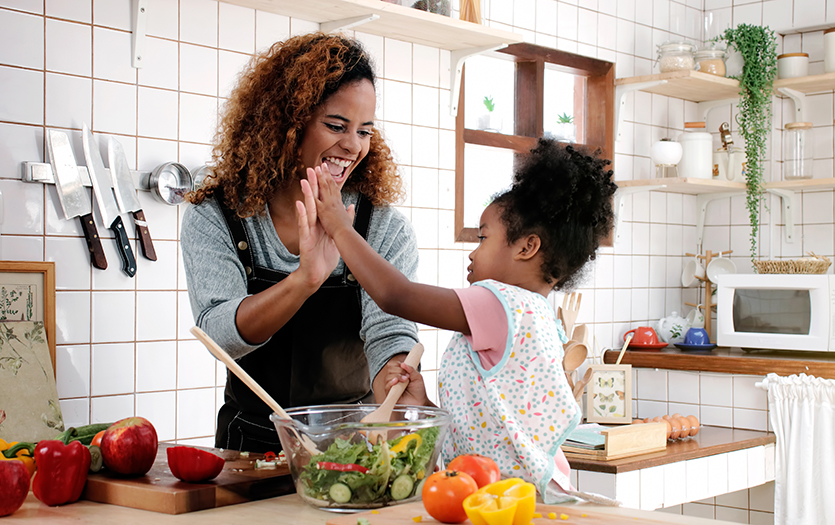
Heart disease continues to be one of the leading causes of death in the United States. With these numbers on the rise, there’s a good chance that you or a loved one have been touched by this devastating disease. Due to the frequency and prominence of severe heart events, it isn’t a bad idea to educate those around you, including your children, to arm them with important knowledge to prevent the worst or recognize it in others. Vimal Jayswal, MD, PPG – Pediatric Cardiology, stresses the importance of heart health education and suggests a few ways to navigate these difficult conversations.
How to get started
It’s never easy discussing life-threatening illnesses, let alone having those conversations with your children. Dr. Jayswal suggests starting the conversation sooner rather than later. “Parents should start as early as possible when educating and cultivating the importance of a healthy lifestyle in their children.”
The American Heart Association also suggests a few things to keep in mind when speaking with your kids:
- One and done won’t cut it. It’s important to realize that any type of educational dialogue isn’t about having just one conversation, but rather a series of conversations on the topic.
- Be prepared. Come ready with what you want to say and try to convey an open-door policy throughout your talk.
- Don’t rush it. It’s a good idea to give your children the information piece by piece. Let the conversation start slowly and then wait for questions to come.
More ways to discuss heart health in a kid-friendly manner
Once you’ve got the conversation started, try covering each of these points with a kid-friendly approach by utilizing the following language:
Becoming heart smart – Try explaining what the heart is and the important role it plays within our bodies. Don’t be afraid to use simple language and descriptive scenarios:
- Did you know that your heart is a special muscle? It helps send blood all around your body, providing oxygen and nutrients where it’s needed. It also helps carry away any waste.
- Did you know your heart is like two pumps put together? The right side gets blood from the body and pumps it to the lungs. The left side does the exact opposite. Instead, it gets blood from the lungs and then pumps it out to the body.
Having happy hearts – Discuss the importance of keeping your heart in good shape and the best ways to keep your heart “happy” throughout your life. A few ways could include:
- Get active, stay active! Just like your other muscles, your heart needs exercise to stay strong. When you do activities like jumping rope, dancing or playing basketball that makes your heart beat faster, helping it get stronger! It’s a good idea to exercise your heart 30-60 minutes each day to keep your heart healthy and strong.
- Eat smart! By eating a good mix of healthy foods and staying away from sugary and fatty snacks you can help keep your heart healthy. Try eating at least five servings of fruits and vegetables each day.
- Don’t smoke! Smoking is bad for your body and over time, it can damage the heart and blood vessels – so don’t even start!
Grown-up heart problems
Once you’ve discussed what the heart is and the healthy choices you can make, try relating it to adults:
Did you know that it’s important for grown-ups to make healthy choices, too? Sometimes, even when adults have taken good care of their heart, they can still have trouble with it. One problem is called a heart attack. As people grow up, the tubes that lead to the heart can get clogged. A heart attack can happen when those tubes get so plugged up that blood can’t get to the heart anymore. It can be hard for adults to know when they’re having a heart attack, but there are some warning signs that could help you know when one is happening:
- Pressure or squeezing in the chest
- Shortness of breath
- Pain that moves down one or both arms
- Passing out or loss of consciousness
What to do if you think someone’s having a heart attack
Tell an adult! Find a parent or grown-up and tell them what’s going on – and why you think it’s a heart attack. They can decide what to do. If you can’t find an adult, call 9-1-1. You’ll need to tell the person who answers where you are and why you think someone is having a heart attack so they can help!
Remember, conversations like this are never easy, but starting a dialogue is better than having no dialogue at all. Dr. Jayswal suggests and encourages families to work together on their heart-healthy goals and lifestyle changes, “A family-oriented, team approach to heart health and care is best. When everyone is chipping in, making more time for family exercise and heart-healthy choices, everyone benefits.”




